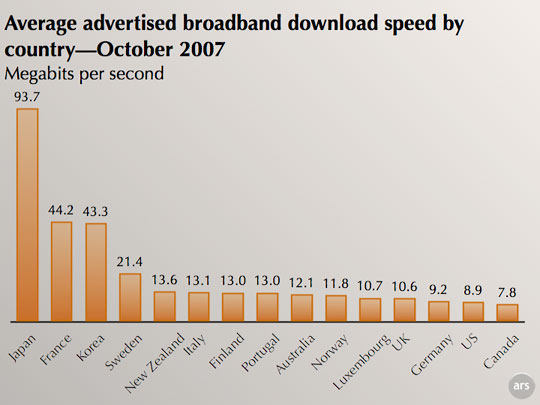A new report from a DC telecom law firm claims, as many other recent reports have, that the US is falling behind when it comes to broadband deployment, and it says that aggressive action is needed to keep the country competitive. What's different about the new report is just how aggressive its recommendations are: 100Mbps of "affordable" broadband available to all Americans by 2012, with 1Gbps service coming online by 2015.
The Baller Herbst Law Group prepared the new report for e-NC, the government-backed entity in North Carolina charged with spurring both broadband rollouts and higher adoption rates. E-NC's chair Jane Smith Patterson was in DC this morning to address a House subcommittee hearing on Universal Service Fund reform, and she made a strong case for more government support for broadband.
The report's argument is that broadband has become a utility service, and that communities that don't have it (or that don't have adequate speeds) are in danger of being left behind. "The history of electrification is repeating itself in the broadband era," says the report. "Like the power companies of the century ago, the major communications providers are focusing first on their most lucrative markets and are leaving less profitable communities behind."
How did communities respond then? Many of them "step forward to establish their own electric utilities, believing that their economic survival and quality it of life were at stake."
The report praises the public/private partnership model of e-NC and suggests that local and state governments across the country need to take their broadband destinies into their own hands to keep from missing out on the massive benefits of fast 'Net connections. But when it comes to a new "moon shot" effort for the entire country, some kind of national leadership would do plenty to help.
Even casting a vision for broadband would be useful, but "the current Administration in Washington has simply refused to come to grips with the reality of America's descent into mediocrity on almost every internationally-recognized indicator of success in broadband deployment."
Look at Japan!

By way of contrast, the report highlights what has happened in Japan during the last seven years, a broadband effort little short of a miracle. It's worth quoting at length:
America's dismal record in broadband deployment is particularly discouraging when compared to that of Japan. In 2001, when the United States ranked 4th in the world, Japan had only a small handful of broadband lines. Spurred by the "broadband miracle" under way in nearby South Korea, Japan's top government and private-sector leaders decided to make Japan the world's leading broadband nation. They then developed and executed an all-hands-on-deck action plan to achieve that goal, including aggressive federal subsidies, low-interest and no-interest loans, loan guarantees, tax breaks, grants-in-aid to municipalities, targeted government purchases of services, a concerted national public education campaign, and a wide range of private-sector initiatives driven by a sense of national purpose and long-term thinking.
Today, Japan has the fastest and cheapest broadband in the world. Consumers in Japan can get broadband that is 10 times faster than the speeds available to average Americans, for prices that are less than a quarter of the prices that Americans must pay. Broadband providers currently compete at 1 Gbps, and this is expected to increase to 10 Gbps by 2010. Broadband is now available almost ubiquitously throughout Japan, and the "almost" will be removed by 2010. Today, 85 percent of households have access to fiber connectivity, and more than 35 percent of households have adopted it. Availability of fiber connective it will increase to 90 percent by 2010.
While the US may be a "bit behind" at the moment, the report warns that the country is in imminent danger of dropping sharply on international rankings. That's largely because the only truly next-generation attempts to bring high-speeds to the home are coming from Verizon's FiOS and from cable's DOCSIS 3.0.
But the report notes that FiOS is only available in a few states and that no other telco has plans to deploy fiber to the home. Likewise, with DOCSIS 3.0, Comcast will take several years to fully deploy it, and other cable operators are taking even longer. Even when rolled out, the promised high speeds must be shared with entire neighborhoods, and cable operators have little incentive to upgrade systems when they're simply competing against DSL.
Baller Herbst admits that the goals in the paper, which are even more ambitious than those touted by EDUCAUSE earlier this year, "are very aggressive and may not be fully achievable." But not staying at the top of the broadband heap comes it with own costs, and the effort and expense are worth making a huge investment.
"We believe that great nations find the means to do what will make them and keep them great," says the report. "The United States has done this time and again—building canals and railroads, developing electric, telephone and highway systems, conquering outer space. Now, the time has come to build a world-class communications network."
reader comments